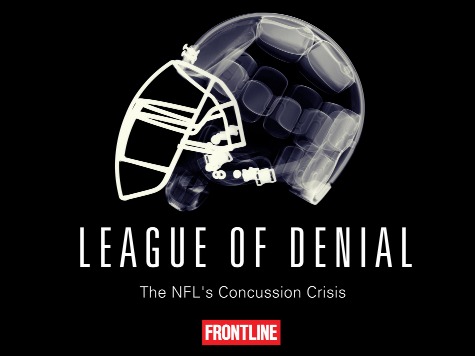Tuesday night’s “League of Denial” PBS documentary appears more sensationalistic Inside Edition than staid Frontline. Atop a montage of pornographic gridiron violence in its promotional trailer, Will Lyman, PBS’s voice of God, intones: “Frontline investigates what the NFL knew and when they knew it.”
Perhaps two M.D.s and a Ph.D. from the University of Colorado School of Medicine had the hyperbolic Frontline trailer in mind when they lamented “media sensationalism” in a new scholarly article outlining widespread misperceptions regarding chronic traumatic encephalopathy (CTE), the degenerative brain disease found in Junior Seau, John Mackey, and other deceased football players. “Traumatic Brain Injury and Chronic Traumatic Encephalopathy: A Forensic Neuropsychiatric Perspective” notes that hype has “primed the public to accept highly reductionist formulations” regarding CTE.
Take, for instance, the common parental fear that a lone sports concussion will lead to CTE or permanent brain damage. “There remains no compelling evidence that a single uncomplicated [mild traumatic brain injury] alone produces severe neuropsychiatric impairment, progressive neurodegeneration, or subsequent dementia,” the doctors note. “Patients and jurors should engage with skepticism clinicians and experts making such claims.”
The article points out a few rather remarkable but little remarked-upon realities: scholars lack a randomized study on which to credibly allege a connection between CTE and contact sports; the two main groups investigating CTE differ on a clinical definition; one marker allegedly indicating CTE actually proves “common among older persons without cognitive impairment”; and the autopsies finding the disease in dozens of athletes remain “methodologically problematic” by focusing on subjects presupposed to have endured brain damage.
Translation? Scientists don’t even understand what journalists purport to understand. If the NFL knew then what doctors don’t even know now, then the sports-business juggernaut surely would boast a science IQ that surpasses even its Nielsen ratings.
Dismissing the University of Colorado School of Medicine professors as an anomaly would be easier if seventeen other scholars hadn’t also denied an established scientific connection between CTE and contact sports in three other academic articles published in recent months. This has been the year of the backlash, with doctors echoing the Consensus Statement on Concussion in Sport issued in Zurich by the best in brain science last November which “agreed that a cause and effect relationship has not as yet been demonstrated between CTE and concussions or exposure to contact sports.” The statement warned doctors about parental “fears” stoked by “media pressure,” surely to intensify in the wake of Frontline‘s “League of Denial.”
Television screens lend themselves to sensationalism, not science. Pixilated pundits regularly draw conclusions without the benefit of actual studies to back claims. But in the evidence-based world of academia, conclusions customarily follow investigations.
CTE wouldn’t be the first controversy in which football’s foes pawned off assumptions as answers.
George Will and Malcolm Gladwell peddled the urban myth that the game lops decades off the lives of pros after federal researchers had proved that pension-vested NFL retirees showed decreased mortality compared to their off-the-field peers, exhibiting dramatically lower death rates from cancer, heart disease, respiratory illness, and even suicide. The mantra that “bigger, faster, stronger equals deadlier” runs up against the happy reality that football collision deaths have declined 84 percent since the 1960s. And Mayo Clinic researchers disproved their own hypothesis last year in a study showing mid-century high school football players with neurological disease rates on par with members of the glee club, choir, and band.
Ironically, anti-football crusaders speak in the name of science as they present falsehood as fact and conjecture as conclusion. Junk science often persuades through social pressure rather than laboratory proof. Real science shows better health outcomes for football players and a dramatically safer sport than the one our forebears played. Such pleasant truths may not be as fashionable as Chicken Little-style claims condemning Pop Warner players to an addle-brained existence, but at least actual scholarly research back them up.
Bad journalists follow the pack; good scientists follow the truth. Rather than air a conspiracy theory hinting that the NFL long ago hid scientific discoveries of which neurologists today remain ignorant, Frontline‘s producers might want to come clean about what they don’t know and when they knew that they didn’t know it.
Daniel J. Flynn is the author of The War on Football: Saving America’s Game (Regnery, 2013).

COMMENTS
Please let us know if you're having issues with commenting.